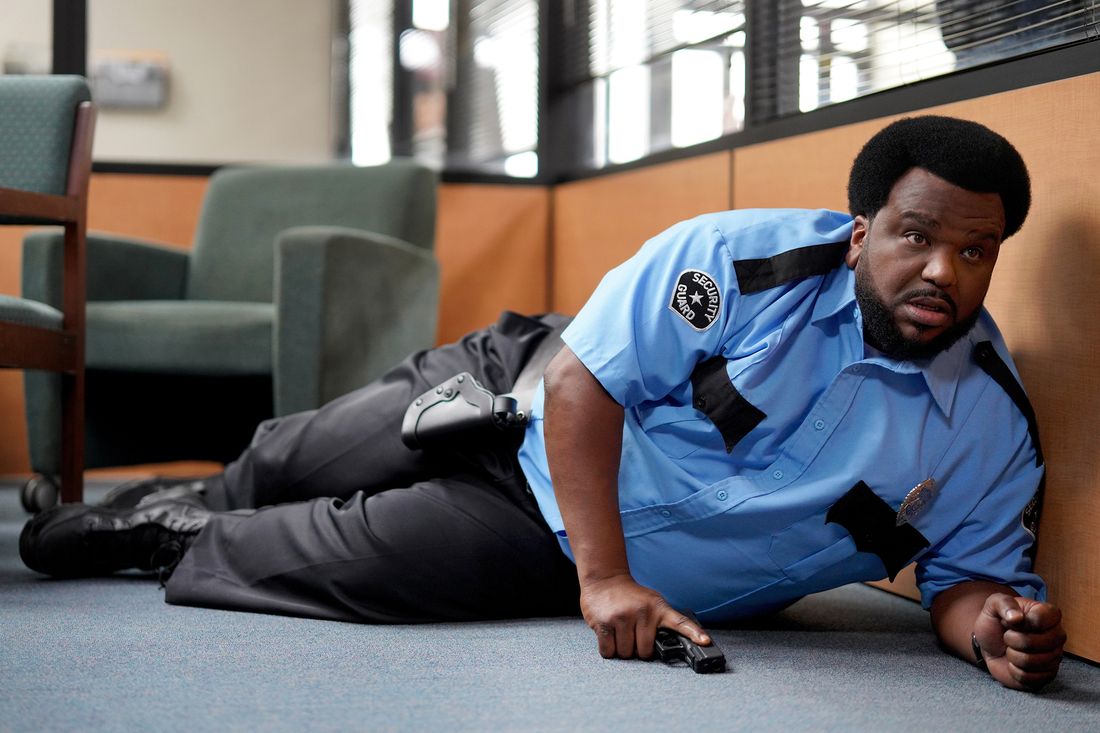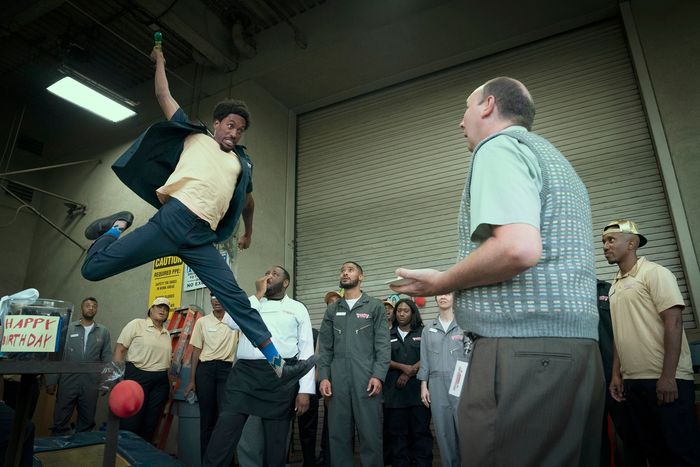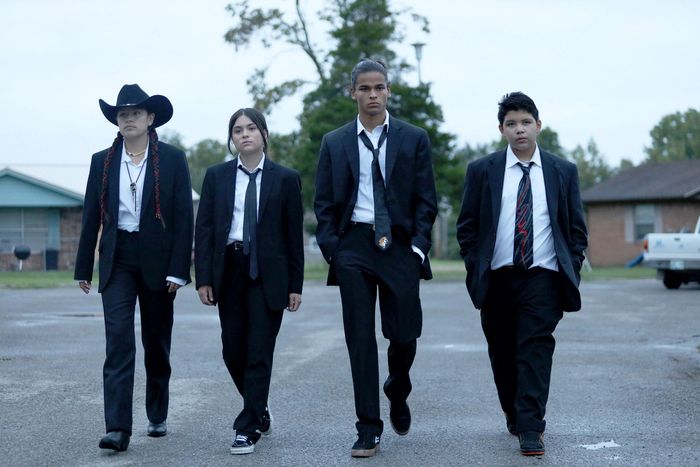
Craig Robinson’s bank security guard in Killing It is a man of belief. The character’s father, who died interrupting a burglary, instilled in him the tenets of meritocracy and its rewards. If he only works hard enough at his dream of opening a saw-palmetto-berry farm that supplies pharmaceuticals, success will inevitably come. His conviction inspires his 4 a.m. pitch practice sessions and guides him into loan meetings with his employer and a potential investor. “This is everything that I’ve ever believed in,” he pleads. “Please, reward my faith.” Craig (also the name of Robinson’s character) is speaking to viewers as much as he is to the slick moneyman listening to his proposal, whose swift rejection makes the show’s villain clear: not so much the man himself but the fantasy of upward mobility.
Killing It is one of a growing number of scrappy, smart half-hour comedies carving out their own quirky, irreverent paths while tackling the illusory nature of the American Dream, slapping their characters and audiences in the face with the knowledge that the whole system is rigged. Of course, sitcoms that center characters living in financially precarious situations aren’t new. In the 1970s, Norman Lear premiered All in the Family, Sanford and Son, Good Times, and One Day at a Time — series that focused on families grappling with economic instability and changing social norms. From the late 1980s to the aughts, Roseanne, The Simpsons, The Wayans Bros., Living Single, and King of the Hill regularly featured episodes in which their central families and friends worry about omnipresent bills and overdue rent, navigate strikes and labor disputes, and bristle at the extra respect society automatically extends to the rich under the assumption that monetary success equals moral goodness. They laid the groundwork for spiritual and direct sequels like Bob’s Burgers and The Conners, shows whose constant shenanigans are owed to the difficulties of running one’s own business, the high cost of prescription drugs and health care, and the seeming impossibility of financially preparing for the future.
These shows have largely been rooted in the home and revolve around the stresses within white nuclear families. Series like Workaholics, Superstore, and, more recently, Abbott Elementary, have flirted with rebellion against corporate and bureaucratic overlords and disparaged office politics, but they are at their core workplace comedies. This crop goes further in reflecting an anti-capitalist spirit. With primarily Black and Indigenous ensembles, Peacock’s Killing It and Bust Down, Showtime’s Flatbush Misdemeanors, FX on Hulu’s Reservation Dogs, and HBO Max’s South Side spotlight working-class frustrations everywhere from the Florida suburbs to an Oklahoma reservation. The characters are, for the most part, on their own outside of their friendships; their jobs and side hustles are top priority out of necessity. These comedies poke at the grind-set mind-set and treat the increasingly distant goals of homeownership (currently experiencing a wider gap between Black and white communities than in 1968, when the Fair Housing Act was passed) and retirement with both cheeky mockery and bittersweet longing.
Bust Down (set in Gary, Indiana, but filmed in Los Angeles) and South Side (set in Chicago and filmed there) are the most traditional in workplace-comedy structure, but the former is most willing to get weird. From co-creators and co-stars Langston Kerman, Jak Knight, Chris Redd, and Sam Jay, Bust Down follows four friends who work at the Diamondback Palace Casino as janitors, valets, and cooks and communicate almost entirely through jokingly combative banter. (“Whose plantation would you work for if slavery got popping again?” they discuss.) They don’t get paid enough to have a “live to work” mentality, so they’re (barely) working to live and goofing around on the clock.
At one point, Redd’s Chris becomes the Lothario of an unhoused community that includes people who used to work at the same casino but were laid off because they got injured on the job. “Trust me, that job does not give a fuck about you,” one of the former colleagues says. Meanwhile, Knight’s Jak and Jay’s Sam attend a seminar run by an influencer–con man who insists poor people are plagued by “broke demons” and says all they need to do is “maniflex” their way to success. Jak is shocked to learn that people paid $140 each to attend the self-help course, but the misplaced hope the crowd derives from the message is real. His teachings aren’t a revelation — they’re an absurd reminder that the characters in Bust Down are economically stuck.
South Side, created by brothers Bashir and Sultan Salahuddin and Diallo Riddle, follows a sprawling cast of Chicagoans but primarily focuses on Rent-T-Own repo men Simon James (Sultan) and Kareme Odom (Kareme Young) — best friends whose daily assignments reclaiming furniture, tech, and other leased items pit them against other Black people in their South Side neighborhood — along with two Chicago cops (played by Bashir and his wife, Chandra Russell) and alderman Allen Gayle (Riddle). Everyone is someone else’s employee, meaning the antics are often about the characters trying to get ahead in systems designed to keep them down, while working jobs they know aren’t exactly beneficial to their communities. “When you was a little homie, did you always dream of harassing Black people for their appliances?” a renter asks Simon and Kareme in the pilot when they attempt to reclaim an Xbox that RTO hasn’t received payment for in years.
Reservation Dogs and Killing It unfold outside the workplace, aiming more broadly at the limitations of their communities. Set in the fictional town of Okern, Oklahoma, the former series, created by Sterlin Harjo and Taika Waititi, follows four Indigenous teenagers: D’Pharaoh Woon-A-Tai’s Bear, Devery Jacobs’s Elora Danan, Paulina Alexis’s Willie Jack, and Lane Factor’s Cheese. They grew up on the reservation and are planning to leave it for California, fulfilling the dream of their fifth best friend, Daniel (Dalton Cramer), who died by suicide. The relationship between the place these characters call home, the ways it simultaneously invigorates and stifles them, and the means they devise to maintain their personhood is integral to the series. Reservation Dogs moves slower than Bust Down and South Side, devoting time to each teen’s backstory and their individual reactions to Daniel’s death. It’s more fantastical, too, with a guiding-spirit character (Dallas Goldtooth) who heckles Bear about living up to his ancestral responsibilities. The members of the group tease and bicker, the conversations dotted with shared memories and inside jokes from years spent in the same small town, with its understaffed clinic, shady junkyard, and plots of land sold off to outsiders to make ends meet. Their theft of a potato-chip delivery truck in the series’ first episode plays out with the loose-limbed ease of slapstick but is telling of the lengths to which they’ll go for some extra cash.
By the end of Killing It’s first season, the show morphs from Trump-era commentary into a coming-of-age story for Robinson’s Craig as he realizes that personal ambition and family loyalty are incompatible in his pursuit of the American Dream and that his belief that “doing the right thing is never a mistake” may not be as foolproof as he thought. The constant disappointment is Killing It’s point.
If the sitcom is meant to be a state of suspended disbelief in which everything resets at the end of an episode, then the series in which normalcy involves characters returning to cocoons of happiness, wealth, or prestige may be a comfort. But comedies that confirm how we’re not alone in our frustrations, disappointments, and doubts provide their own kind of reassurance. In an unequal world, the resurgence of the working-class sitcom may be the only good inflation we’ve got.





